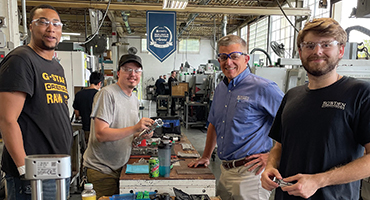How does a manufacturing shop combat an ongoing machinist shortage? The answer at Bowden Manufacturing was to stop calling them machinists.
When the Willoughby-based Bowden recruits students and recent graduates for its Manufacturing Next Gen Program, it refers to the position as “manufacturing engineer.” Bowden president Andy McCartney says the term is both more reflective of what working with computer numerical control (CNC) machines and other heavy equipment entails and is more appealing to candidates … and, importantly, their parents.
“Their parents don’t want to tell their friends, ‘My kid’s working as a machinist,’” McCartney says. “You use the word ‘engineer’? It’s [proudly], ‘Hey, my kid’s an engineer!’”
Same job, different marketing
Bowden must be onto something, because the Next Gen program has been the backbone of significant growth for the company. Not only has the talent acquisition program, which began in 2016, provided nearly half of Bowden’s workforce, but it has allowed the company to take on more complicated projects.
Engineering students would traditionally be viewed as overqualified for a job on a shop floor. They probably didn’t go to college with dreams of working second or third shift. But Bowden’s two-year training program gives these students a valuable companion to classroom learning, a real-world look at how manufacturing works. And many of them wind up staying with Bowden.
“I think we have 20-some mechanical engineers with degrees that are essentially running on the shop floor,” McCartney says. “For other [companies], it’s unthinkable that you would get a degreed engineer to come and run machines for you for any period of time, let alone for years at a time.”
For aspiring design engineers, the shop floor accelerates the learning curve that would ordinarily take place over many years in a cubicle. Those who complete the program have a better understanding of the processes of making a part and assembling it with other parts. And for Bowden, the infusion of youthful energy on the shop floor has been a plus for company culture.
“It’s hard to find machinists out there,” McCartney says. “Super hard. So, we’ve got to grow. If you’re going to start with a candidate, would you want the person who walks in off the street with a GED? Or would you want the person who walks in off the street from Akron University, either that’s there because they need a co-op semester or because they just graduated with an ME [Master of Engineering]?”
Shop smarts
Finding and grooming manufacturing engineers with a high intellectual capacity helps Bowden stay nimble and successful in a demanding and cyclical business. The company’s customer base can evolve quite a bit based on industry trends, presidential administrations, etc. Bowden serves the defense, aerospace, oil and gas, and industrial sectors.
In recent years, through its Bowden Tactical arm, it has also taken on commercial firearm manufacturing. The percentage of the business dedicated to each of those sectors can vary from year to year, month to month, or even week to week. So, McCartney says the flexibility of the CNC machines helps.
“But more important,” McCartney adds, “as our reality adjusts based on the volume, we can communicate [to customers] very consistently and proactively what our lead time is. And then, every week, we send them an update on where we are and, if there are any changes, we highlight them so they know what they can expect from us. It’s that communication system that has really set us apart.”
Lifelong learner
Bowden has also improved its internal communications. Daily morning e-mails alert the engineering team and senior leadership to personal development opportunities. And a “Frustration Index” allows employees to report on their frustration level (from 1 for a smooth day to 5 for an extremely frustrating one) at the end of each shift in order for team leaders to address issues more rapidly. That’s all part of the continued refinement of a company run by a self-described “lifelong learner.” A graduate of the U.S. Naval Academy, McCartney joined Bowden in 1998 and succeeded his father, Arch, as the company’s president.
“I love manufacturing,” he said. “It is very tactile. You solve problems, and you can see the results of your efforts. If you build a process, you can see how it creates value for your customer and ultimately then back to you as a business.”
The Manufacturing Next Gen Program is an extension of that concept. Faced with the workforce shortage problem affecting so many companies, Bowden built a process that works.
“It is challenging, because our industry is so used to having the 20-year machinist,” McCartney says. “That is the foundation of everything. The timelines have shortened for us, because it’s stereotypical for the younger generation to get bored easily. So, we’ve got to make sure we keep it fresh for them. It’s just about refining the process and continuing to build a system that engages them and has them want to be a part of it.” ●


